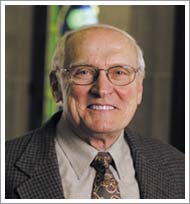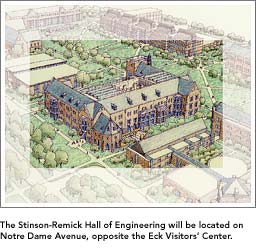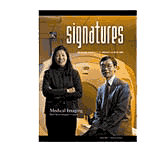
Dear Friends of Notre Dame,
We are more than halfway through another academic year, and I write
to you filled with enthusiasm for the College of Engineering.
 At the
top of the list is Stinson-Remick Hall, the new multidisciplinary
engineering education and research building. We have spent much of
the last semester working with BSA Life Structures of Indianapolis,
the architectural firm that has guided us through the intricacies
of designing what will be a beautiful campus addition on Notre Dame
Avenue, opposite the Eck Visitors’ Center and Notre Dame
Bookstore, with more than 76,000 assignable square feet for undergraduate education
and several of the signature research programs of the college. Centerpieces
of the building include a beautifully-designed, centrally-located student learning
center that is nearly four times the size of the experimental center created
in Cushing Hall, and a state-of-the-art nano- and micro-device fabrication
and processing facility. The building will also house the Center for Nano Science
and Technology with associated electronic materials and device activities,
an ultra-high vacuum crystal growth system, our newly-emerging Energy Center,
and an extensive materials characterization facility. In addition, the building
will provide space for the future senior faculty that we are aggressively recruiting.
It is being named in honor of principal benefactors Kenneth and Ann
Stinson and Jack and Mary Ann
Remick. The learning center will be named in honor of
major benefactors Ted and Tracy McCourtney. To these supporters we give our
heartfelt thanks. At the
top of the list is Stinson-Remick Hall, the new multidisciplinary
engineering education and research building. We have spent much of
the last semester working with BSA Life Structures of Indianapolis,
the architectural firm that has guided us through the intricacies
of designing what will be a beautiful campus addition on Notre Dame
Avenue, opposite the Eck Visitors’ Center and Notre Dame
Bookstore, with more than 76,000 assignable square feet for undergraduate education
and several of the signature research programs of the college. Centerpieces
of the building include a beautifully-designed, centrally-located student learning
center that is nearly four times the size of the experimental center created
in Cushing Hall, and a state-of-the-art nano- and micro-device fabrication
and processing facility. The building will also house the Center for Nano Science
and Technology with associated electronic materials and device activities,
an ultra-high vacuum crystal growth system, our newly-emerging Energy Center,
and an extensive materials characterization facility. In addition, the building
will provide space for the future senior faculty that we are aggressively recruiting.
It is being named in honor of principal benefactors Kenneth and Ann
Stinson and Jack and Mary Ann
Remick. The learning center will be named in honor of
major benefactors Ted and Tracy McCourtney. To these supporters we give our
heartfelt thanks.
This fall
we also opened a 16,000-sq.-ft. multidisciplinary engineering research building
on the north end of the campus, which houses a team of five faculty working
on various aspects of orthopedics. These young engineers maintain strong ties
to the three major orthopedics companies in Warsaw, Ind., just 30 miles south
of campus, providing the industrial experience for our students that should
be a hallmark of a modern engineering program. Several of these faculty have
joined with me to participate in a statewide task force to build on the presence
of the Warsaw powerhouse and contribute to the economic engine of the State
of Indiana.
Another
opportunity has presented itself this year in the form of a major addition
to the Notre Dame Center for Flow Physics and Control (FlowPAC): DARPA, a branch
of the Department of Defense, has awarded Notre Dame a new turbine wind tunnel
that will be housed this spring in yet another building for aeronautical engineering,
located north of the campus across Douglas Road from the Hessert Laboratory.
This $3 million machine will enhance the seminal work being conducted through
FlowPAC in collaboration with a multitude of major industries.
Other important
initiatives are being aggressively pursued for the college. These include an
expansion of our bioengineering efforts (a Ph.D. program in this area has just
been approved by the University), an interdisciplinary environmental research
program that will extend to all corners of the University, and a Center for
Research Computing for which we are currently recruiting a director.
Our Lady
has blessed us with an inspired faculty, devoted members of the college executive
team, and wonderful students. It is, in fact, the students who make this job
worthwhile, for Notre Dame attracts the finest students in the land. I am proud
and humbled to be allowed to preside over this college, but it is the work
of many, many talented people who make the job possible. We are blessed with
outstanding leadership in the Office of the Provost and the Office of the President,
who envision a major role for engineering in our quest to become a truly great
Catholic university. Thanks to my predecessor, Frank Incropera, to whom we
owe a monumental debt of gratitude, the college is well positioned to move
through the 21st century. So, my report to you, in essence, is that we are
on track to be recognized as one of the outstanding engineering programs in
the United States.
Sincerely,

James L. Merz
Interim Dean and the Frank M. Freimann
Professor of Electrical Engineering
|

